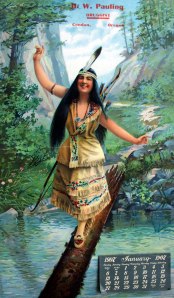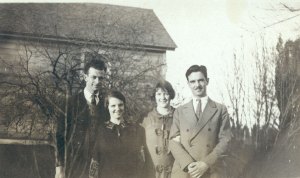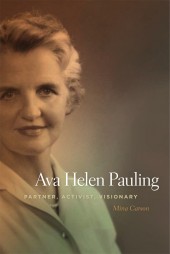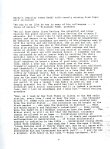Widowed with three kids, Belle Pauling found herself at a major crossroads in life at the young age of 29. After initially seeking out some measure of continuity by hiring a manager for her deceased husband’s drugstore, Belle was soon forced to sell both the store and her house in order to buy a larger house. Her intent in doing so was to take on boarders, one of the few income possibilities open to her, given that all three of her children were still under the age of ten.
Having never been in charge of the family finances, Belle made some initial mistakes as she overpaid for the house and, in hopes of offering an attractive place for boarders, bought several expensive appliances. She also hired someone to cook and clean. Burdened by these expenses, Belle chronically teetered on the edge of being able to make enough rental income to support her and the children.
Belle’s life began to crumble in other ways as well. Her years-long battle with depression only worsened and she was soon diagnosed with pernicious anemia, which left her physically weak. At first she refrained from telling the children, as she did not want to frighten them with the possibility that they may soon lose their mother. Left to care for the children by herself, Belle let them run free around the neighborhood well into the night. She was also unprepared to deal with her maturing daughters. As Pauline later recalled, Belle made her and Lucile feel that menstruation “was a scourge that afflicted only women in their family.”
Belle found some relief through weekend visits to Herman’s parents, times during which she could reminisce about the days when her husband and their son was still living. She also fulfilled one of her lifelong dreams of owning a piano. She and the children began taking lessons and would have singing parties: Lucile, who took the most to the piano, would play as Pauline joined on ukulele and Linus sang. In 1913 the family was also able to take a vacation to the Oregon coast, staying in the house of a friend. This was the only time that the family would take such a trip.
Once Linus was 13, he began to help out more by taking on odd jobs – delivering papers, milk, and letters, selling meat, and projecting movies. He didn’t particularly enjoy this work, but Belle came to depend on him more and more for income, so after quitting one job he would soon have to find another. He even found short-term employment resetting pins at a bowling alley while the family vacationed at the coast.
Belle’s dependence on her children, especially on Linus and Pauline, began to wear on them. After Belle had to let the cook and maid go, she relied even more on the children to take care of the house. Linus later remembered his mother “issuing requests and orders and browbeating the children, often from her bed.”
On one occasion, Lucile had taken a boy’s bike for a ride without his permission. Once she was finished, the boy punched Lucile to the ground. When she came home crying to her brother, imploring him to go beat up the boy, Linus refused. Belle strongly disapproved of Linus’s decision and admonished him as a bad brother. Unsurprisingly, as he reached adolescence, Linus began distancing himself more and more from his mother.
As Pauline reached her teenage years, she also came under pressure from Belle. Rather than look for a job to bring in income, Belle wanted Pauline to marry someone wealthy. When Pauline was seventeen, Belle had found just the man for her. Pauline did not take well to her mother’s pressure, particularly since the man was thirty years old. Belle’s persistence became unbearable and Pauline eventually called the police, telling them that her mother was forcing her into marriage with a much older man.
In the fall of 1917, Linus enrolled at Oregon Agricultural College in Corvallis. Belle’s nephew, Mervyn Stephenson, was already a junior there and so she arranged for Linus to live in the same boarding house. Had her nephew not been there, Belle would not have let Linus attend college, and she continued to believe that he should keep working to help support the family. She rode down to Corvallis with Linus to stay with him for his first night there and to make sure that everything was in order. After she left, any pretense that her nephew would help Linus disappeared; he offered Linus some advice on getting by in college and after that the two saw very little of each other. Linus moved out of the boarding house soon afterward.
With Linus away and not working as much, Belle began a courtship with William Brace Bryden, a lumberman. In a manner very similar to her first encounter with Herman nearly twenty years earlier, Belle’s sister Goldie set the two up on a blind date. By June 1918 they were married, but it did not last long. Bryden was not helpful and neither Pauline nor Lucile liked him. Additionally, when Belle came down with the flu, Bryden offered little assistance. After Belle recovered and was strong enough, the two constantly argued until, one day in September, Bryden left to go to the barbershop and never came back.
While Linus attended college, he continued to work and send money home to his mother. By the Spring of 1922, Linus was ready to step further away from his mother’s influence. He and Ava Helen Miller were recently engaged to be married and Linus made plans to attend graduate school in southern California, where he hoped Ava Helen would join him. Belle and Ava Helen’s mother, Nora Gard Miller, quickly intervened. Both mothers thought it best that their child finish their educations before getting married. The young couple gave in and Linus went to California alone.
With Linus nearly 1,000 miles away, Belle kept him up-to-date on life in Portland, and the news was often not good. As her health continued to worsen, Belle began to see doctors more and more. One doctor had her fast for three days and then stayed with her all day as he administered one quart of olive oil over four doses. Belle told her son, “It is a wonderful treatment, takes all the poisons out of your system. I feel like a new woman. I am weak yet but will soon feel strong.” The positive effects rarely lasted long though and Belle continued to seek out different treatments, sometimes against Linus’s wishes.
In October 1922, Linus sent Belle a letter trying to get his debts to her in order. This shocked Belle as she could not understand why Linus felt that he owed her, preferring that he continue to support her and his sisters out of purer motives. Nonetheless, her response could not have helped but make him feel either guilty or resentful:
Do you think because I have let you help carry the burden this year that you are repaying me for money I gave you for your education or the cost of your living since you were born or perhaps pay me for the pain I suffered in bring you into this world… You are helping the girls and not me personally… I have never worried when I had money to give you but I have worried a lot because I couldn’t help you more.
Part of Linus’s money was going to support Pauline’s college tuition – she had also gone on to OAC, leaving Belle and Lucile alone in Portland. Belle and her youngest daughter got along relatively well and the two traveled together and spent days out shopping downtown. Both of them were also members of the Order of the Eastern Star; Belle was able to join earlier only because she had made Linus join the Masons. At the meetings, Lucile sometimes sang, which pleased Belle even more.
Linus, however, continued to disappoint his mother. One year, while in Pasadena, he had forgotten her birthday. Belle did not take this well, writing:
I look around me and I see lots of young men who have mothers (and fathers too) who are lovely to their mothers. I tell myself over and over that you do not mean to be unkind but even so such a situation is very depressing.
Linus and Ava Helen also began to make new plans to marry and this gave Belle even more to worry about, as she wanted them to hold the ceremony near to her. Linus, though, did not include Belle in on the planning, giving her another cause for concern.
Linus made up for all of this by sending his mother a birthday card and a letter which made Belle “feel so much better.” Ava Helen also tried to bring her some comfort by offering to come up to visit her, but Belle claimed she was too busy as she had four boarders to attend to at the time. At long last, in June 1923, Linus drove up to Salem, where he and Ava Helen were married. The two then drove to Portland to stay with Belle before going down to California for Linus to continue his schooling. They returned in the summer of 1925 with their first-born child, Linus Jr.
By that time Pauline had married the athletic director of the local Elk’s Club and the two had moved to Los Angeles. This devastated Belle, causing her to collapse. From then on Lucile was the only one around to care for Belle, whose health continued to deteriorate. Belle began to suffer bouts of delusion and loss of feeling and movement in her limbs. She left many of the household decisions and responsibilities up to Lucile, something for which the nineteen-year-old was not well prepared.
In March 1926, Linus and Ava Helen came to visit on their way to Europe. They needed someone to take care of Linus Jr. and had arranged to leave him with Ava Helen’s mother. When Linus saw his own mother, he was shocked by her appearance – her gray hair and poor balance were clear indications that she was not doing well. He was tempted to cancel the trip, but ended up going, leaving some money behind to help pay for the increasing expenses surrounding Belle’s care.
Two weeks after Linus and Ava Helen left, Belle sold her home to Lucile for ten dollars, who rented the house out so that she and her mother could move to a smaller apartment. But Belle’s condition only worsened as she became increasingly restless and had trouble sleeping. Her moods also grew more volatile, moving from suspicion to happiness to fear. Eventually Belle’s behavior became so unmanageable for Lucile that she called her aunt Goldie to help. The two decided that it was best that Belle be moved to the state mental hospital in Salem. Her admittance form summed up Belle’s difficult life:
Natural disposition? ‘Moral character good. Disposition happy. Lost husband 16 years ago – raised family through great struggles.’
First symptoms of mental derangement? ‘Worried from illness and too much responsibility.’
Lucy Isabelle (Darling) Pauling passed away in Salem on July 12, 1926.
Filed under: Pauling and Oregon | Tagged: Ava Helen Pauling, Belle Pauling, Linus Pauling, Lucile Pauling, Mervyn Stephenson, Pauline Pauling, pernicious anemia, Portland, Salem | Leave a comment »




















































